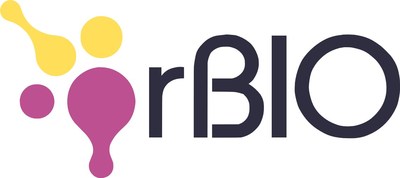rBIO, an early-stage synthetic biology company focused on reducing the cost of increasingly costly biologic therapies, announced refinement of its bacteria-based production of insulin.
Just one year after successfully demonstrating lab-scale production of human insulin using synthetic biology techniques, rBIO recently concluded a successful optimization project with Washington University in St. Louis, and firms its path toward commercialization and large-scale production.
SAN DIEGO, May 3, 2022 /PRNewswire/ -- rBIO, an early-stage synthetic biology company focused on reducing the cost of increasingly costly biologic therapies, announced refinement of its bacteria-based production of insulin. rBIO's synthetic manufacturing process now yields twice the volume of insulin compared with legacy recombinant manufacturing techniques and positions the company for commercial-scale production of insulin using a proprietary process developed in partnership with Washington University in St. Louis.
This readiness for market positions rBIO for future protein and peptide pipeline candidate development and production. In the near term, rBIO will enter the market sooner than anticipated and will achieve entry with a goal of reducing the cost of prescription insulin by one-third.
rBIO collaborated on this research and development project with Washington University in St. Louis, a team led by Dr. Sergej Djuranovic, associate professor of cell biology and physiology at the university's School of Medicine.
Over the past year, Dr. Djuranovic's team has focused on optimizing and scaling up a proprietary process that applies recent breakthroughs in genetics and synthetic biology science to design new strains of genetically modified bacteria capable of expressing a wide variety of peptide hormones. Earlier, Dr. Djuranovic's laboratory had discovered coding motifs used to decrease the expression of certain proteins in cancer cells. The team leveraged this prior work: focusing on how analogous motifs could increase expression — thereby accelerating rBIO in its quest to increase pharmaceutical yields.
"The production of recombinant proteins has traditionally been complex, expensive, and time-consuming. Being able to show these results opens the possibility to increase production yields and drive down the cost of certain pharmaceutical proteins," said Dr. Djuranovic. "We've begun research into other molecules of interest that may open the door to other verticals in addition to peptide hormones such as insulin."
"The team spent a year determining how much we could increase yields by driving higher expression of insulin. We are thrilled to announce that our process now yields human insulin at twice the rate of legacy recombinant methods," said microbiologist Cameron Owen, the CEO and co-founder of rBIO. "With this type of biological power, we're eager to scale up and commence industrial-scale production — and make this crucial hormone available at a lower cost to the millions of Americans suffering from diabetes."
About rBIO
rBIO Corp. is a biotech startup focused on applications within synthetic biology to reduce the cost of prescription drugs. Our goal is to re-shore insulin manufacturing to the USA and make this crucial hormone available at a lower cost for the millions of Americans suffering from diabetes. rBIO was formed by a team from Johns Hopkins and UCSD, whose backgrounds include genetics, bioengineering, and bioinformatics. Based in San Diego, rBIO is privately funded. For more information, visit rbio.com.
Media contact:
Tim Cox,
ZingPR,
tim@zingpr.com
![]() View original content to download multimedia:https://www.prnewswire.com/news-releases/rbio-doubles-insulin-output-over-legacy-manufacturing-methods-putting-company-on-track-to-reduce-insulin-costs-by-30-301538278.html
View original content to download multimedia:https://www.prnewswire.com/news-releases/rbio-doubles-insulin-output-over-legacy-manufacturing-methods-putting-company-on-track-to-reduce-insulin-costs-by-30-301538278.html
SOURCE rBIO Corp.





